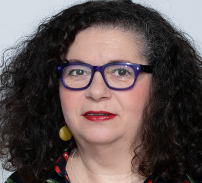Mark Hahnel and Maria Cotera discussed how Figshare enables global reach and discoverability of African research data. They shared insights on building inclusive research infrastructure and advancing open science across Africa and beyond.
Watch the recording
Speaker’s profiles
Mark Hahnel

Mark Hahnel is the founder of Figshare, which he created whilst completing his PhD in stem cell biology at Imperial College London. Figshare currently provides research data infrastructure for institutions, publishers and funders globally. He is passionate about open science and the potential it has to revolutionize the research community.
Maria Cotera

A former academic librarian and currently partnerships development manager at Figshare, Maria Cotera supports open science and responsible research by developing strategic relationships which bring Figshare data and institutional repositories to universities and research institutes across Africa, the Middle East, Southern and Eastern Europe.
Questions that were addressed during the session
How does Figshare support African researchers in making their data more visible and accessible to a global audience?
At Figshare, we provide an easy-to-use platform where researchers can upload and share datasets, figures, and even presentations, all with DOIs for easy citation. Our goal is to make African research discoverable globally, ensuring it’s visible in search engines and integrated into broader research ecosystems like ORCID and Google Scholar.
What are some of the key challenges Figshare has observed in research data sharing across African institutions, and how is Figshare addressing them?
One challenge is limited digital infrastructure, which can make data sharing seem overwhelming. We address this by offering user-friendly, low-bandwidth solutions and supporting institutional repositories tailored to local needs. Training and capacity-building workshops are also a big part of how we help institutions overcome technical hurdles.
Can you share examples of successful collaborations or repositories in Africa that are powered by Figshare?
Yes! We’ve had the pleasure of working with organizations like the African Academy of Sciences and some leading universities that use Figshare to host their research outputs. These collaborations have helped amplify African research globally, giving it a proper home where it’s easy to find, access, and reuse.
How does Figshare ensure the discoverability and interoperability of African research data within the broader open science ecosystem?
All content on Figshare is assigned persistent identifiers (DOIs) and is indexed in major scholarly databases. We also comply with FAIR data principles, making sure data is Findable, Accessible, Interoperable, and Reusable. Our integrations with systems like ORCID and DataCite help research from Africa seamlessly fit into the global open science landscape.
How African Researchers and Institutions Can Learn and Benefit from the Session with Figshare
Learning How to Increase the Visibility of African Research Outputs
The session explained how Figshare platforms can make African research outputs highly discoverable worldwide by using permanent identifiers and optimizing metadata for search engines and research databases.
Building Institutional Repositories with Ease
Researchers and institutions learned that they can easily set up their own branded repositories using Figshare’s flexible technology, even with minimal technical resources. This can help African universities showcase their research on a global stage.
Understanding the Importance of FAIR Data Principles
The discussion emphasized how applying the FAIR (Findable, Accessible, Interoperable, Reusable) principles enhances the usability and impact of African research. Figshare’s infrastructure automatically supports these principles, making compliance much easier for researchers.
Overcoming Technical and Infrastructure Challenges
The webinar addressed real-life barriers like internet connectivity issues and limited repository expertise. Figshare’s support services, low-bandwidth interfaces, and training opportunities offer practical solutions tailored for African contexts.
Opportunities for Global Collaboration and Networking
Through Figshare, African researchers were shown how they can connect with global networks, foster collaborations, and participate in international open science initiatives, strengthening both personal and institutional research profiles.
Gaining Recognition and Credit for Data Sharing
Finally, participants learned that with Figshare, sharing datasets and other research materials isn’t just about storage—it’s about getting academic credit. Every item shared receives a DOI, which researchers can cite in their CVs, grant applications, and publications, thus enhancing career growth.
Related resources
- AfricArXiv on Figshare: https://africarxiv.figshare.com/
- Figshare South Africa: https://knowledge.figshare.com/in/south-africa
About the webinar series
This webinar was co-organized by UbuntuNet Alliance and Access 2 Perspectives as part of the ORCID Global Participation Program.
ORCID is the persistent identifier for researchers to share their accomplishments (research articles, data, etc with funding agencies, publishers, data repositories, and other research workflows.
AfricArXiv is a community-led digital archive for African research communication. By enhancing the visibility of African research, we enable discoverability and collaboration opportunities for African scientists on the continent as well as globally.
